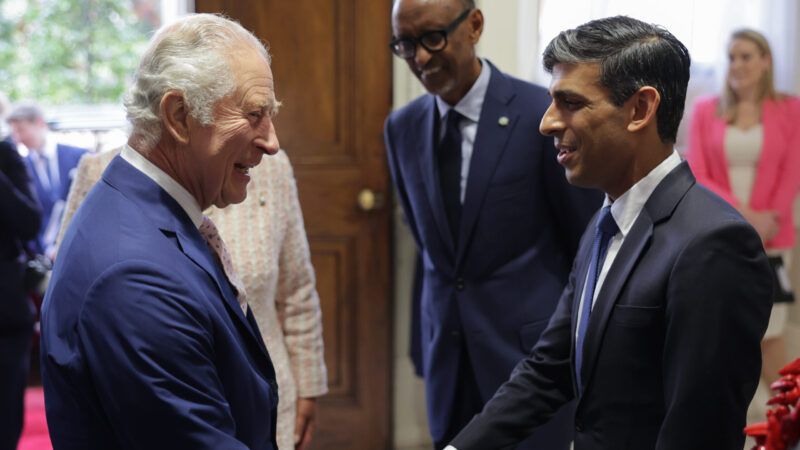How Does the British Monarchy Survive?
Britain’s parliamentary democracy still transcends its monarchy.

For any intelligent outsider watching this weekend's coronation in London, it almost certainly raises one question: Just how does an institution as unashamedly archaic as the British monarchy survive some 200 years of parliamentary democracy? The answer comes down to one word: neutrality.
Scratch beneath the surface and most Britons—even those proudly hanging the Union Jack bunting for the coronation—realize deep down how illogical it is to structure our entire constitution around one ruling family. Yet they also believe (perhaps correctly) that keeping our monarchy completely neutral is a foolproof system to eliminate any threat.
Of course, when it comes to party politics, that's easy enough. But in the age of the all-consuming culture wars, true neutrality can be hard to maintain. The modern-day risk isn't necessarily that the king expresses political views, it's that his views or actions end up becoming politicized.
We saw an example of this last November when the monarchy became dangerously close to being embroiled in a full-blown race quarrel (a row, incidentally, that did not involve Meghan Markle). It began when a long-term palace aide (a personal friend of the late queen) stepped down from her duties following her tactless questioning of a black British guest. Within hours, the story had exploded.
On television channels like GB News, right-wing blowhards thundered their predictable outrage that an 83-year-old aristocrat could be forced out for a supposedly innocent faux pas. In response, progressive newspapers ran equally template op-eds about how seriously we should all take so-called microaggressions in the workplace.
You may well have a view on the rights and wrongs of the Lady Susan Hussey saga. But that isn't the point. The real question is how an institution like Buckingham Palace—inevitably seen as an extension of its inhabitant—is meant to handle such a predicament when any response risks fanning the flames of the culture war.
In the end, the palace got it exactly right: with an unambiguous factual statement that stayed well clear of any wider "debate" around racism. Once the story had disappeared from the front pages, it quietly reinstated Hussey.
In the run-up to the coronation, the potential for a crisis has been even bigger. Take this week's surprise announcement from Buckingham Palace that the ceremony will break with tradition by inviting members of the public—yes, we mere mortals—to join in the traditional swearing of allegiance to the newly crowned king. This slightly clumsy gesture soon became the subject of a tedious online debate between pledgers and refuseniks.
What made the situation worse was the fact that England had just entered the final stretch of its local election campaigns. All of a sudden, any senior politician appearing on the broadcast rounds was being quizzed as to whether he personally would be pledging. Cue this rather cringeworthy clip of Foreign Secretary James Cleverly waxing obsequiously about the king's "very generous invitation."
Of course, some of the biggest bear traps were much closer to home for King Charles. Since he took the crown in September, the British media have been ablaze with speculation as to whether Prince Harry would attend the coronation. Perhaps inevitably, the Harry feud has become "coded" by the culture wars, with the estranged prince caricatured as an entitled "woke" brat whose values run contrary to British traditions.
At times, it seemed like an almighty storm might be blowing. Yet here we are at coronation and the bomb has been defused. Will there be difficult conversations this weekend between Harry and his father and brother? Almost certainly. But they will take place in private, and they won't stop the family from putting on a united front for the coronation.
Perhaps it sounds like simple public relations, but it runs much deeper than that. For the British monarchy, these kinds of controversies aren't just a potential image problem—they're an existential threat. A monarchy that divides opinion, particularly along existing cultural fault lines, risks undermining its own legitimacy.
That Charles has skillfully navigated the minefield so far means that Britain can actually come together to celebrate the coronation, albeit in the typical understated and semi-ironic way that we approach these occasions. By joining a street party or meeting a toast, you're not making any kind of statement—which is just the way it should be.
Underneath all the pageantry, it's quite simple: A Britain with a politicized monarchy is no longer a proper democracy. One of those matters more than the other.
